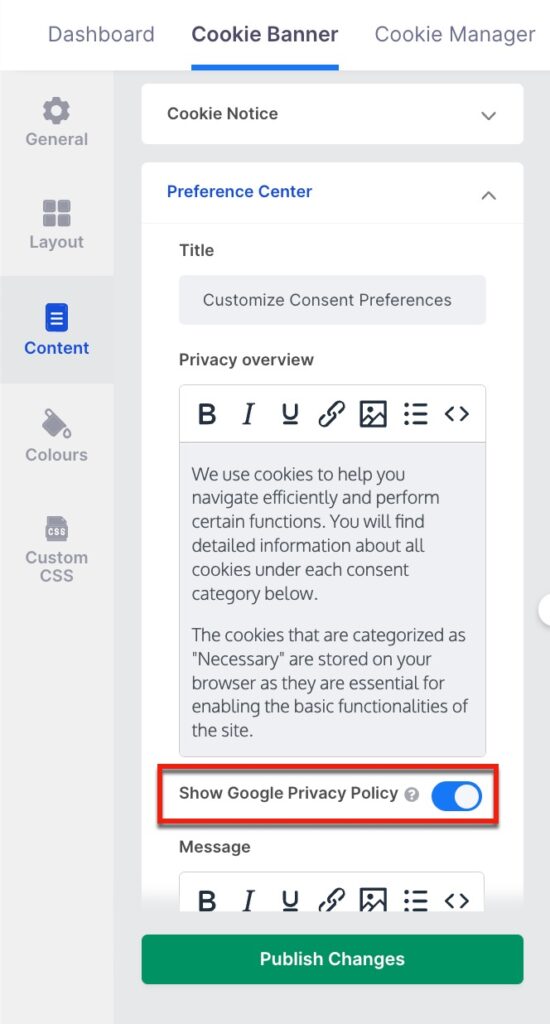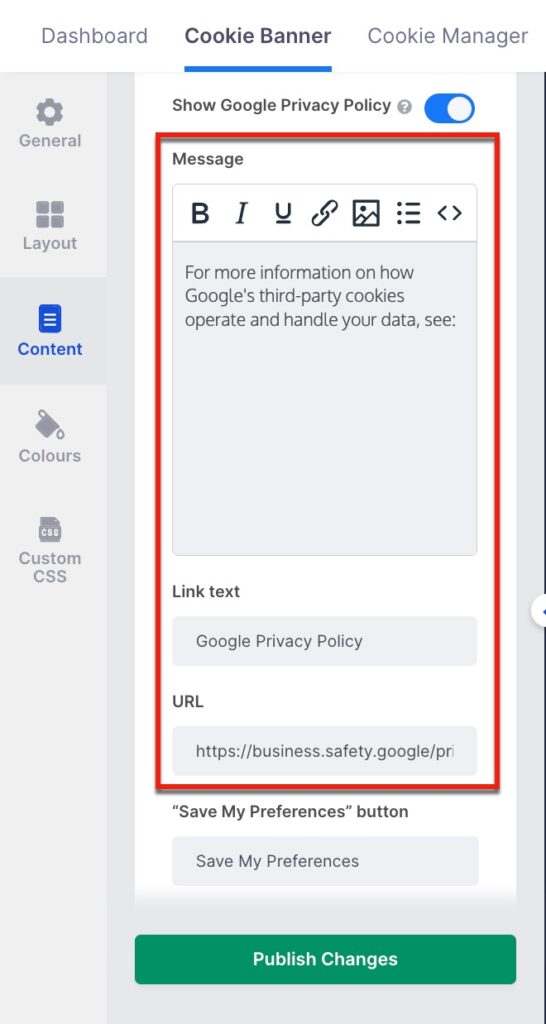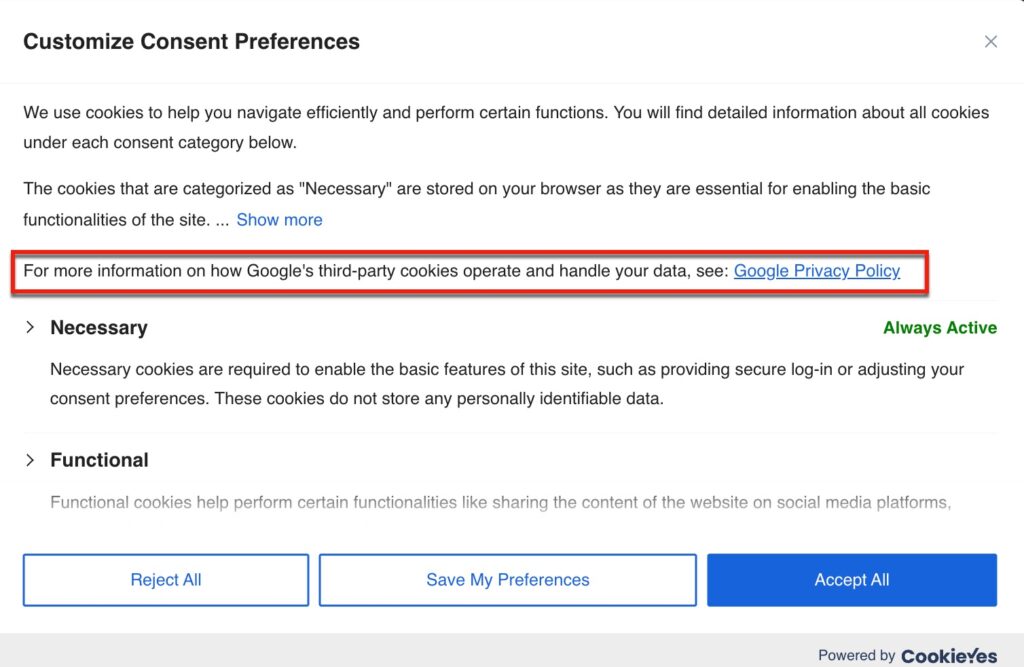Digital Markets Act and CookieYes
Last updated on March 14, 2024
The Digital Markets Act (DMA) is a groundbreaking new law in the European Union that aims to increase competition and consumer welfare in the digital economy. The DMA regulates major technology platforms acting as gatekeepers and places strict obligations on companies like Google, Apple, Facebook and Amazon.
This document looks at the core ideas of the DMA, its impact on gatekeepers and how CookieYes can help gatekeepers conform to its transparency and user consent requirements.
What is the Digital Markets Act?
The Digital Markets Act (DMA) lays forth new ground rules for big platforms that act as gatekeepers in the digital economy. It only applies to firms fulfilling the European Commission’s requirements for serving as gatekeepers. The main goals of DMA are to ensure fair competition in the digital industry, prevent gatekeeper platforms from abusing their market dominance, provide users with additional options and lower pricing and encourage the development of innovative and high-quality digital services.
To achieve these goals, the DMA puts special responsibilities and limitations on gatekeepers. These involve operational mandates like sharing data to bans on behaviours like self-preferencing their services. The obligations aim to fix unfair advantages while opening gatekeeper platforms and increasing opportunities for others. The DMA adopts an innovative strategy for regulating the digital economy by focusing on the disproportionate influence of gatekeepers. Compliance will need significant modifications for covered gatekeepers.
Benefits of the Digital Markets Act
The Digital Markets Act seeks to reshape the digital landscape to be more equitable and competitive. It aims to generate advantages for different stakeholders:
Consumers
The DMA promises major advantages for digital service consumers. By furthering competition and transparency, users gain expanded selections, reduced costs, and enhancements from providers vying to serve diverse needs. Interoperability rules prevent lock-in and enable flexible service switching. Inherent data portability and privacy principles return control over personal data to users. Eliminating gatekeeper self-preferencing lets services thrive on innovation versus unfair edge. Altogether these DMA reforms channel greater value to consumers through affordability, quality, convenience, control, and equity in reinvigorated digital realms. Users ultimately benefit as competitive dynamics, not gatekeepers dictate, shape online experiences.
Businesses
The DMA institutes pivotal safeguards and guarantees for businesses under gatekeeper influence. Foremost, fair access to core services is mandated, preventing the exclusion of business users. Strict curbs on self-preferencing ensure equal footing to compete based on merit versus advantage. Interoperability standards expand integration opportunities across gatekeeper ecosystems. Redistributing user data rights assists businesses in better serving and honing offerings for customers. Provisions around service switching and third-party apps enable meeting flexible consumer demands. Redress mechanisms provide recourse against unfair gatekeeping. Above all, by diluting gatekeeper dominance, the DMA seeks to open avenues for innovation, partnerships, funding, and growth. Unconstrained by gatekeepers, businesses can deliver greater value by focusing on consumer needs over gatekeeper priorities.
Startups & Small/Medium Enterprises (SMEs)
The DMA intends to foster dynamic startups and smaller enterprises by reducing the influence of Big Tech gatekeepers. Interoperability and data sharing regulations will enable entrepreneurs to get access to established platforms and user bases to scale their innovations. With fair access guaranteed to core services like app stores, cloud infrastructure, and digital ad markets, startups can circumvent gatekeeper bottlenecks that previously blocked growth. The DMA’s anti-self-preferencing rules will allow startups to compete based on merit rather than with gatekeeper favouritism. Redistribution of market power should unlock more venture capital and investment flows to fund entrepreneurs. SMEs will get a fair chance from equal platform access to reach their customers and create partnerships. By diluting gatekeeper control, the DMA intends to stimulate startup ingenuity and empower smaller firms to monetise ideas and gain market footholds previously reserved for entrenched incumbents.
Digital economy
The main goal of the DMA is to catalyse growth, innovation and fair competition in the digital economy across Europe. By reducing the power of Big Tech gatekeepers, the DMA hopes to stimulate productivity gains across a broader range of participants. Removing gatekeeper constraints gives more room for specialisation and collaboration to drive innovation. Investor money can flow into promising startups unfettered by incumbent obstruction. Consumers will gain access to specialist services from new entrants who can expand by fair norms. The DMA aims to change the digital landscape from walled gardens controlled by a few gatekeepers into vibrant markets teeming with creative solutions. Economic output and innovation will decentralise and diversify rather than remain trapped in siloed tech monopolies.
EU citizens
The Digital Markets Act significantly benefits EU citizens by elevating transparency, choice, and control within the digital economy. Obligations related to data protection mandate that gatekeepers adopt transparency and openness regarding data collection and utilization, thereby facilitating informed consent. Through interoperability mandates, citizens gain the ability to seamlessly transition between services, mitigating the risk of vendor lock-in. Prohibitions against self-preferencing ensure that citizens have access to authentic choices rather than options curated by gatekeepers, with requirements such as data portability and pre-installed app selection restoring agency to users in shaping their digital experiences.
The DMA, in its pursuit of decentralization, grants individuals access to more specialized services tailored to their specific needs. In participatory digital marketplaces driven by innovation and customer service, citizens fundamentally profit from the DMA’s provisions, rather than being subject to arbitrarily enforced gatekeeper regulations. The DMA effectively restrains gatekeeper authority, empowering EU residents with increased control over their digital lives.
How Digital Markets Act Will Impact Gatekeepers?
The Digital Markets Act imposes sweeping changes on how gatekeepers operate core platform services to prevent anti-competitive behaviour.
- Self-Preferencing Ban – Gatekeepers can no longer unfairly promote or favour their products, services, or business partners over third parties on their platforms. This eliminates conflicts of interest in which gatekeepers favour their affiliated offerings over competing options that may better fulfil customer demands.
- Interoperability Mandates – Gatekeepers must open walled gardens and make their core platform services compatible with third-party applications or apps. This will increase user choice, innovation and healthy competition against gatekeeper services.
- User Data Restrictions – Gatekeepers must implement stringent technical measures for access controls, data governance, database segregation, and algorithm auditing. This necessitates building ethical systems, anonymizing data and preventing unlawful uses of aggregated insights, especially for anti-competitive purposes against business users.
- Transparency Requirements – Gatekeepers must notify the European Commission about mergers, acquisitions, and other operations that affect the gatekeeper’s duty. They will also be required to provide data related to gatekeeping procedures upon request. This facilitates regulatory oversight.
- Penalty Deterrence – Steep fines of up to 10% of global turnover incentivize compliance from gatekeepers. Violations could impact bottom lines and stock performance.
Adhering to these obligations will require monumental changes for gatekeepers accustomed to dominating markets. The DMA aims to undo the unfair advantages gatekeepers have accumulated and create more equitable digital markets.
Implementing Digital Markets Act with CookieYes
The DMA’s transparency and consent requirements overlap with cookie consent laws like the ePrivacy Directive; gatekeepers can use CookieYes to comply. Follow these steps to Implement Digital Markets Act consent banners using CookieYes:
- Log in to your CookieYes account on app.cookieyes.com.
- Navigate to Dashboard > Cookie Banner.
- In the Content tab, click Preference Center.
- Now, toggle the button (to the right) labelled Show Google Privacy Policy.

- Customize the Message, Link text and URL shown in the banner per your DMA needs.

- Click Publish Changes.
Once you publish the changes, your site will automatically deliver the DMA-compliant consent banner to users.
